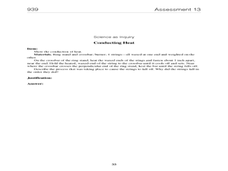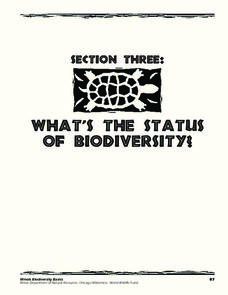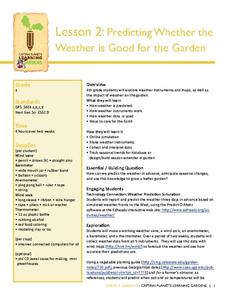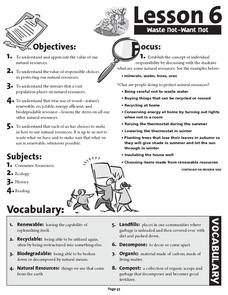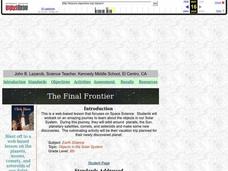Sea World
Endangered Species
Study different endangered species with several activities that incorporate math, science, language arts, and research strategies. A great addition to your instructional activity on conservation or Earth Day.
AAAS
Identification and Classification of Grassland Plants
Take learning outside and start classifying grasslands. Young ecologists observe grassland plants in order to classify them into the appropriate species by family. They note their characteristics and where they grow. A true field...
Curated OER
Evidence of Heat Transformations
Earth, life, and physical science classes can all benefit from understanding heat transfer. There is not room enough to describe these seven exceptional laboratory experiments that explore conduction, convetcion, and radiation. Several...
Ocean Explorer
Architects of the Coral Reef
Coral Reefs are the focus of a life science lesson plan. Upper graders look at how coral reefs are formed, how the animals and plants reproduce, and the variety of ways that humans benefit from coral reefs around the world. Groups of...
Illinois Department of Natural Resources
Section Three: What's the Status of Biodiversity?
Biodiversity is essential for every habitat, but many species are at risk due to pollution and other factors. Explore several different species native to Illinois in a gallery walk with posters that learners have created after research...
Curated OER
Ecology Integration Using IMovie
Amazing! Any 5th grader would be more than willing to participate in this project. Students are broken into groups, each group reads one book from a list of five. They use their book as the basis for choosing an animal and environment to...
Curated OER
Get a Leg Up
Traveling through space is an amazing experience, but it definitely takes a toll on the body. After reading an article and watching a brief video, learners perform an experiment that simulates the effects of zero gravity on the human body.
Curated OER
Sand Shakes & Mud Pies: Investigating Sediment
Take a field trip to a location where water and land meet to study patterns of sediment organization in wet habitats: river or ocean beaches, sand dunes, tidal marshes, the edge of a pond, or a woodland stream. Small groups collect pairs...
Micron Technology Foundation
Early - Weather and Seasons
Young scientists from any region can take a scientific journey and be exposed to weather changes that include rain and snow.
Michigan State University
Bug Lyphe!
Introduce ecology classes to biodiversity and interdependence in ecosystems with a PowerPoint presentation. Then, they get up-close and personal with the invertebrate world by collecting insects, classifying them, and graphing their...
Illinois Department of Natural Resources
Section One: What is Biodiversity?
Four intriguing and scientific activities invite learners to explore the natural resources of their town. The activities cover concepts such as genetic traits, organizing species in a taxonomy, the differences between different species...
United Nations
Compost Monitor Training
What should go in the trash, and what can be composted? Guide your young conservationists through the process of composing their trash with a lesson about the different ways we can dispose of garbage. Using a trash bag with clean...
Science 4 Inquiry
Carbon and Climate
The carbon cycle is natural and has happened for millions of years, so can humans change it? Young scientists play the role of carbon as they travel through the carbon cycle. They complete two rounds, once before the industrial...
Nature Works Everywhere
Sharks and Shorelines
Examine predator-prey marine relationships through an interactive lesson design. Learners begin by studying a specific shark species and then analyze real-time shark-tracking data. They also study threats to shark populations and...
Growing Classroom
Space Travelers
Groups of three scientists from the rocky planet Zog investigate the composition of soil so that they can take the information back to their home, create soil there, and begin to grow food.
Captain Planet Foundation
Sorting Out Soils
Sift through soil and learn about why it's important for organic processes. After discussing what makes up soil, such as the living organisms and what types of soil have more nutrients, kids sample layers of mulch and deeper soil to...
Curated OER
Moh's Hardness Test
Young geologists utilize Moh's hardness scale to help them correctly sort and classify different types of rocks. This lesson has everything you need, including an excellent example of the Mohs' Hardness Test, to successfully implement...
Captain Planet Foundation
Rotting Away
What happens at the end of a plant's life cycle? Show kids the natural way that plants show that they're decomposing, as well as the importance of compost, with a lesson about living organisms. After reading Log Cabin by Anne Schreiber,...
Captain Planet Foundation
Which Plant Is Which?
Learn about dichotomous keys, plant identification, and how to care for the planet with a lesson that includes several hands-on and innovative activities. Kids go on a plant scavenger hunt and classify the plants that they find...
Captain Planet Foundation
Predicting Whether the Weather is Good for the Garden
Can your class predict the weather? Show them how they can come close with a lesson about creating weather instruments, including weather vanes, barometers, wind socks, anemometers, and thermometers. Kids research weather patterns and...
Forest Foundation
Waste Not - Want Not
Recycling is the focus in the sixth of a nine-lesson series devoted to forest ecosystems. Class members read an article about the responsible use of natural resources and ways to reduce land fill.
Curated OER
Planets in Our Solar System
Each member of a four-student group takes on a specific aspect of an assigned planet to research. After gathering information, the team works together to create a travel brochure and a presentation intended to convince other classmates...
University of California
Energy and Biomass Pyramids
Young scientists play tag as they act out the food pyramid in the ocean ecosystem. Energy circles pass from the smaller prey to the predators and at the end of the activity, a data chart and analysis questions allow pupils to apply their...
Curated OER
Towers of the Lost City
Middle school marine scientists compare the pH change in distilled and saltwater as acetic acid is added one drop at a time. Then they compare the pH change in both when sodium hydroxide is added. This experiment demonstrates the...
Other popular searches
- Earth Science Moon Phases
- Branches of Earth Science
- Earth Science Minerals
- Earth Science Inquiry
- Earth Science Lesson
- Earth Science Lesson Plans
- Basic Earth Science
- And Earth Science
- Earth Science Map Reading
- Earth Science and Art
- Earth Science Vocabulary
- Science Earth Layers




